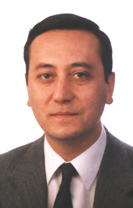| 1. Please tell us something about yourself. I am a Spaniard, born in Seville 41 years ago. I studied Philosophy and Theology at the University of Navarre. Presently, I am Associate Professor in the Department of Philosophy, where I teach Ontology and Introduction to Philosophy. Since the year 2000, I have been promoting the Corpus Thomisticum project. |
2. Give us a description of this project.
Our goal is to make available on the Internet useful tools of research on Aquinas: a complete and reliable edition of the Opera omnia, a bibliography as exhaustive as possible, a collection of historical sources, the Index Thomisticus database, etc.
3. It looks like a monumental project. How long have you been working on it?
I conceived the idea in 1993. At that time, I was a visiting scholar in Notre Dame University, using its computer facilities for a research on Aquinas' stylometrics. But I only began working in the Corpus Thomisticum project by the end of year 2000. Thanks to the efficiency of computers, and to the important materials already prepared (as the Index Thomisticus' original records), many documents were ready in just some few weeks. Improving and completing that material is a less algorithmic task, that takes more human work and is consequently slower than a computer program.
4. Why did you engage in this project?
First, because also I would like to have had it available on the Internet. Second, because supply creates demand: with good text and tools available, more scholars will study Aquinas, and we all will do it better.
5. What are the next steps of the project?
We are finishing a first Internet edition of the Index Thomisticus database. It will provide a powerful search engine on Aquinas works. Also, we will publish in the next weeks a new edition of the Bibliographia Thomistica, with some 8,000 references.
6. Thomism has suffered a certain decline from the time of the Second Vatican Council. What do you think the present state of Thomism is? What do you see as its future?
I do not think that progressist theologians are very influential except in certain clerical environments, and these are obviously less and less influential in society. As a matter of fact, Aquinas is more studied now than ever: Thomistic publications are getting close to 400 per year. There are less dissertations from ecclesiastical institutions than in 1950, but many more studies from University professors who are specialized in Aquinas. Thomism is and will be less an ecclesiastical issue and more a field of study for professional scholars.
7. Are there any particular problems that the Church faces today that you think the work of St. Thomas can help address?
The main task of the Church today is a new evangelization of the world. We need many intellectuals and professionals with a catholic mind. Let them get familiar with Thomism in the school and in the University, for there is not a better vehicle of the catholic sense. With that intellectual background, every one of them will be more capable to provide a good response for the problems of his field and of his time. Some people may think that a Thomistic frame of mind stops from progress: the historical truth is that the most innovative, original, and influential Catholic thinkers all along the modern times were formed in the climax of Thomistic schools. Catholic thinkers were truly influential in XVIth century, in the beginning of the XVIIth century, and in XXth century: that is, precisely in the times of a prevalent Thomist formation in schools and Universities.
